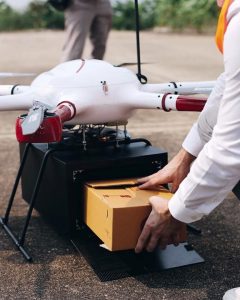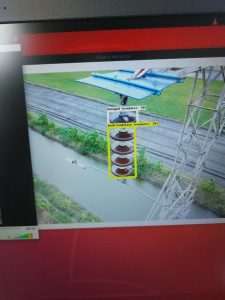Drones, or unmanned aerial vehicles, are increasingly being developed for both commercial and non-commercial purposes. Their deployment in densely populated urban environments will transform our skies—as well as the way we live. In Southeast Asia in particular, companies are conducting trials using these airborne machines in a bid to solve the region’s logistics challenges. Without a doubt, drones will be a fixture in the cities of the future.
Fling is a leading drone services provider headquartered in Bangkok. Founded in 2017, the company has been growing rapidly, with backing from communications conglomerate True Corporation. It offers an array of services, including surveillance and inspection, risk assessment, data collection and analysis, sensor integration, software evaluation, and delivery services. Fling’s regional clients are in a variety of sectors, and typically employ the firm to conduct inspections, surveillance missions, and remote sensing.
KrASIA recently spoke to Fling’s founder and CEO, Michael Currie, to find out more about the potential applications for drones in Southeast Asia, as well as the obstacles that hamper their adoption.
One of the great things about drones is that they can survey a large swath of land in a relatively short time, offering a vantage point and form of mobility that other vessels don’t have. For example, in the agricultural sector, drones can provide farmers with information about the terrain. Fling’s multispectral surveys involve Lidar technology, which can scan more than four hectares per minute and produce real-time feedback on crop health, giving farmers the information they require to improve crop yields, as well as estimates for crop biomass that lead to better revenue projections. For someone who operates a large plantation, drone surveys can ensure that crops are checked regularly and efficiently, and that fertilizer application and irrigation is optimized.
Fling can also outfit its drones with photogrammetry tools for construction projects. By utilizing GPS coordinates and other data, the company conducts automated flights at each stage of the site’s preparation to capture high-resolution images, allowing the project team to make decisions based on detailed analysis. For instance, the data that is gathered could tell the team how much concrete is needed to fill the space between a wall and a cliff face.

Perhaps the most fascinating trend is that of flying delivery drones that are presented as solutions to the last mile problem in logistics. Since UAVs are not limited by road layouts, delivery times can be slashed, assuming the air space isn’t overcrowded. Fling has tested the delivery of cooked food, pharmaceuticals, medical devices, and other urgently needed goods. It takes the company’s drones less than seven minutes to reach a destination within ten kilometers, assuming the load size is about half a cubic metre and weighs up to two kilograms, though larger drones could carry significantly heavier payloads. Like its counterparts anywhere else in the world, the startup is still running a trial phase and working with regulators to figure out what oversight the sector needs. However, Currie remains optimistic about Fling being able to offer drone deliveries in Thailand’s outlying provinces as early as this year, and then in Bangkok in 2020.
Currie believes that safety measures, such as parachutes and autonomous obstacle avoidance, will make drone adoption more palatable and that public trust can be won over through partnerships with local authorities and research institutions. In collaboration with the Thai Resuscitation Council, Chiang Mai University, the Geo-Informatics and Space Technology Development Agency, and the Civil Aviation Authority of Thailand (CAAT), Fling has studied how drones can save lives during certain medical emergencies at the Chiang Mai Marathon.
Currie says one of the key actions that will lead to his business’ success is to proactively approach regulation, as most countries in the region have tough laws to ensure that drones are piloted responsibly and in restricted authorized areas. Standards for the private drone ownership and operation in Thailand were made more stringent by a law introduced in 2015, making flying legally in the country—whether for personal or commercial purposes—quite difficult. Regulators around the world are moving with various degrees of boldness in permitting “advanced” missions, wherein drones are flown close to people, within cities, or beyond the line of sight of the pilot. Fling has been cooperating with Thailand’s authorities, including CAAT, to develop formal standards for approving these forms of usage. The company has also performed demonstrations of its drone technology for Thai government agencies.

In a regional environment that is dominated by foreign players, Currie emphasizes the need to strengthen collaboration with regulators to empower domestic firms, because some of the outsiders have acquired greater capacity and expertise in countries where regulations aren’t as restrictive, such as China. For instance, as part of its global smart supply chain network, China’s second largest online retailer JD.com has tested commercial use of drones in Indonesia.
Currie admits that privacy is undoubtedly one of the biggest concerns surrounding the use of drones. When we see or hear the word “surveillance,” chances are we think of security cameras designed to monitor our personal movements and actions. However, this is not often the case for Fling, and the company is trying to overcome public concern and adjust that association. To build the case for commercial drone deployment, the company is highlighting how its drones can be used in situations where they may be key to saving lives, like when blood is urgently needed for emergency transfusions, or in less dire cases when medication is delivered to patients. In other words, drones as tools aren’t a threat, it’s how we use them that matters.
Surveillance is ubiquitous in many parts of the world today, thanks to the cheap availability of CCTV cameras as well as the hardware and software needed to store and process large amounts of video data. Drones put cameras in the air and make them mobile. Because of this inherent access to a new vantage point, many people perceive drones as having the potential to invade their privacy.
Currie says that commercial drone operators are not part of this problem since they are held to a professional standard. “At Fling, as a commercial drone operator, we take people’s privacy extremely seriously, not just as a matter of complying with the law, but also as part of being a responsible operator.” Will people change their minds about drones? Only time will tell. For now, Fling is offering new ways for players in agriculture, construction, logistics, and other sectors to streamline their operations.
This article is part of KrASIA’s “Startup Stories” series, where the writers of KrASIA speak with founders of tech companies in Southeast Asia.
